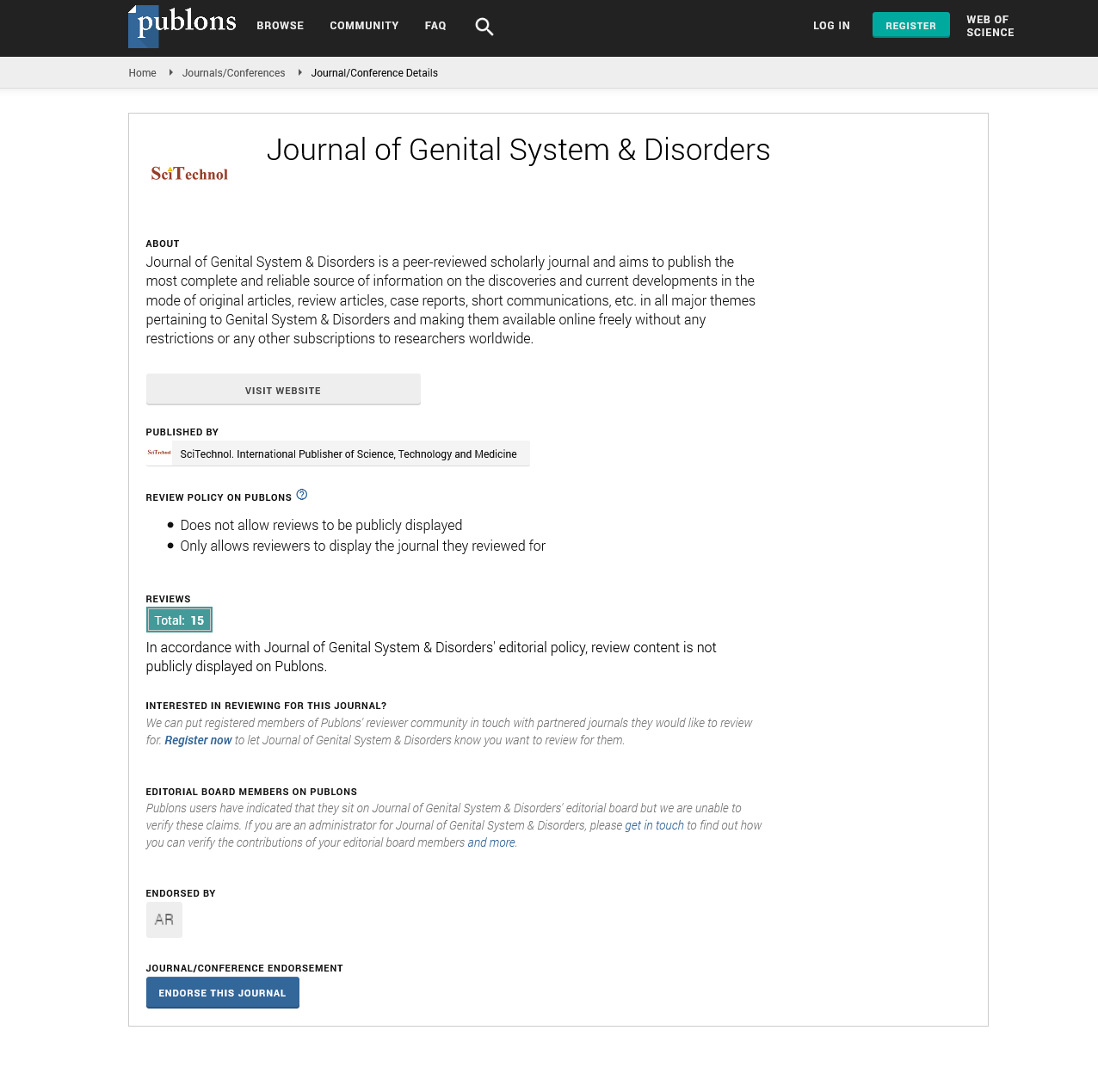Commentary, J Genit Syst Disord Vol: 12 Issue: 2
Potential for Pregnancy in Obese Men and Women Surgery for Obesity
Barni Vidarson*
Department of Surgical Sciences, Uppsala University, Uppsala, Sweden
*Corresponding Author: Barni Vidarson
Department of Surgical Sciences,
Uppsala University, Uppsala, Sweden;
E-mail: Barni@surgsci.uu.se
Received date: 11 January, 2023, Manuscript No. JGSD-23-86816;
Editor assigned date: 13 January, 2023, PreQC No. JGSD-23-86816 (PQ);
Reviewed date: 27 January, 2023, QC No. JGSD-23-86816;
Revised date: 18 April, 2023, 2023, Manuscript No. JGSD-23-86816 (R);
Published date: 25 April, 2023, DOI: 10.4172/2325-9728.1000279
Citation: Vidarson B (2023) Potential for Pregnancy in Obese Men and Women Surgery for Obesity. J Genit Syst Disord 12:2
Description
Through a number of processes, obesity may have a considerable impact on female fertility. Obese women who have a compromised hypothalamic pituitary ovarian axis may have infertility and anovulation. Obesity may have an impact on women's rates of naturally occurring and artificially induced conception, elevated miscarriage rates, early labour, stillbirth and perinatal hazards, and irregular menstruation. It has been hypothesised that weight loss enhances reproductive results by improving ovulation, menstrual irregularity, and fertility. Which weight loss techniques (lifestyle modifications, medication management, or bariatric intervention) have the best effects on infertility are still unknown. The best treatment option now available for managing obesity and the disorders it is associated with is bariatric surgery.
Many women who are of reproductive age may have bariatric surgery, which may affect fertility after weight loss, nutrient needs during pregnancy, or the effectiveness of contraception to avoid pregnancy. Our specific objectives were to estimate the prevalence of bariatric surgery among women between the ages of 18 and 45 and conduct a systematic review to evaluate the effects of the procedure on pregnancy outcomes, such as those for the mother and the unborn child, adverse nutritional events, fertility, contraception, the best time to postpone getting pregnant, and surgical complications during labour. Data tables were created using abstracted study results. Data pooling was not feasible due to the heterogeneity of the patients, interventions, and results. Consequently, we narratively presented the data regarding the following outcomes: Gestational diabetes, hypertension, preeclampsia, and caesarean birth.
Outcomes are affected by maternal weight increase, surgical problems, and dietary deficits. Fertility, the ideal window of time between surgery and pregnancy, and the effectiveness of contraception. Premature delivery, birth weight, macrosomia, and perinatal death. Two cohort studies examined the effects of gastric bypass on mothers. They both discussed subsequent deliveries after bariatric surgery in the same practice. Contrasted the bariatric surgery group's success rates to those of a control group made up of the following two deliveries that followed the index case and were matched for age and prior caesarean delivery. Male and female sexual functions, hormonal balance, sperm count, and conception rates were all dramatically enhanced by bariatric surgery. The strongest proof was discovered about how bariatric surgery affected sex hormones.
Certain vasectomy, scrotal or testicular surgery, prostate surgery, big abdominal surgery for testicular or rectal cancer, among other procedures, can all prohibit you from having sperm in your ejaculate. Using some illegal substances, such as cocaine and anabolic steroids. Weighing too much. Experiencing emotional distress regular use of saunas or hot baths, as well as prolonged sitting, wearing tight clothing, or working on a laptop, can all temporarily diminish the sperm count.
Prior to using ovulation inducing medications or assisted reproductive methods, obese infertile women should first try to cure their obesity, especially abdominal obesity, which is linked to improvements in reproductive capabilities. Although there are many methods for losing weight, including diet, exercise, pharmaceutical treatment, and surgical intervention, changing one's way of life remains of utmost importance. Obesity is mostly caused by an imbalance between inadequate activity, excessive dietary intake of foods high in energy, changing lifestyle habits, and dietary composition. It is well established that systemic illnesses like diabetes, heart disease, hyperlipidemia, sleep apnea, cancer, and osteoarthritis are linked to obesity. The most frequent reason for female infertility is Polycystic Ovarian Syndrome (PCOS). Insulin resistance and visceral fat are important pathophysiological processes underlying PCOS. Infertile women with this illness frequently have bariatric surgery in the hopes of becoming pregnant thereafter.
 Spanish
Spanish  Chinese
Chinese  Russian
Russian  German
German  French
French  Japanese
Japanese  Portuguese
Portuguese  Hindi
Hindi 
